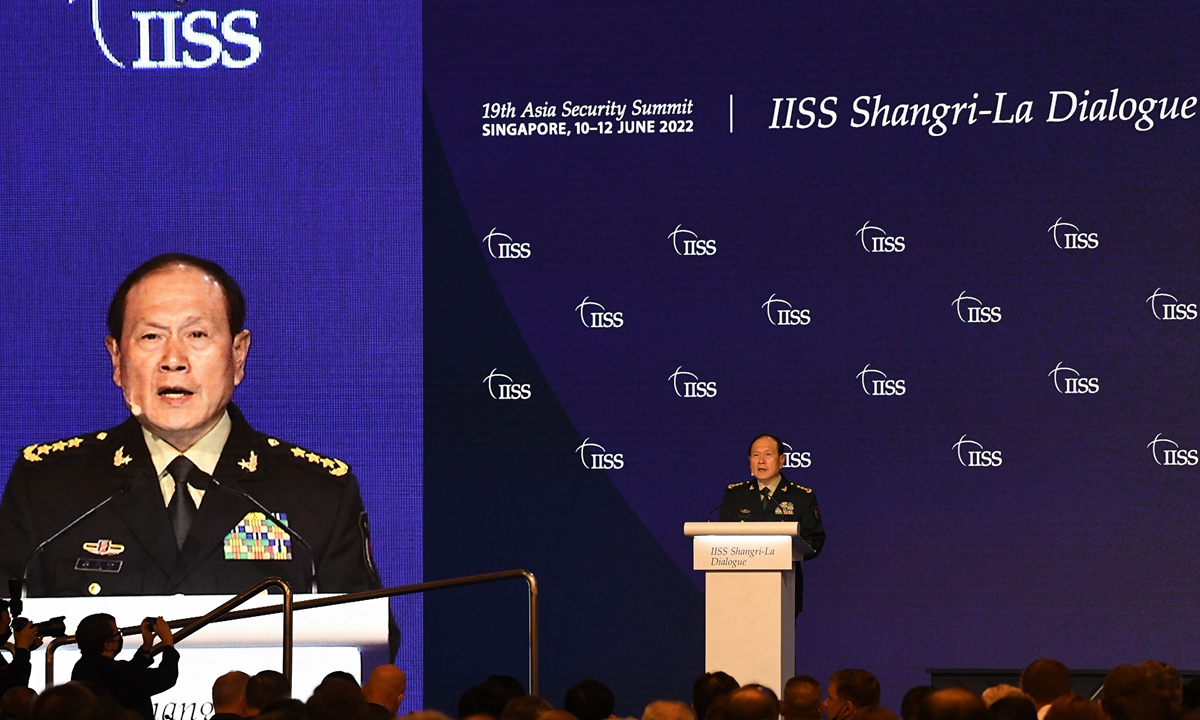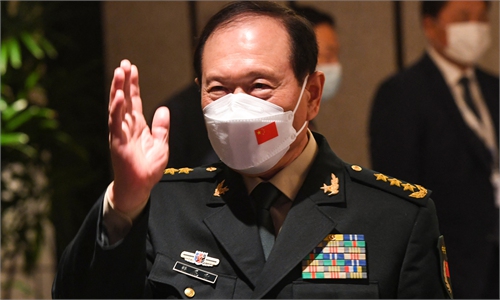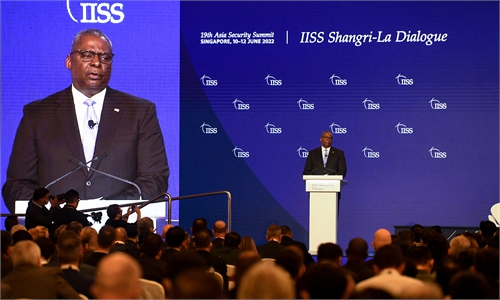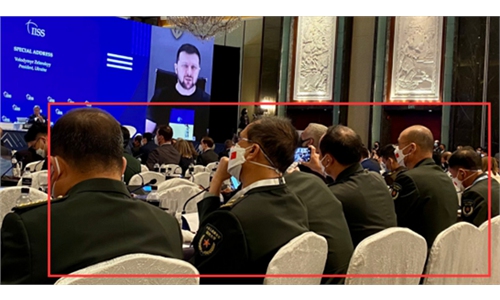Chinese defense chief sends 'strongest warning' to US on Taiwan question; 'Indo-Pacific strategy will fail to divide region'

China's Defence Minister Wei Fenghe speaks at the Shangri-La Dialogue summit in Singapore on June 12, 2022. Photo: AFP
The Chinese armed forces will fight to the very end if anyone dares to split Taiwan from China, said the Chinese defense chief in a speech delivered at the Shangri-La Dialogue on Sunday. Chinese analysts said this is the strongest warning China has sent to the US, as Washington has frequently used the Taiwan question to provoke China and encourage the separatist authorities on the island to worsen the region's security situation.
Chinese State Councilor and Defense Minister Wei Fenghe on Sunday delivered a speech on China's vision of regional order at the 19th Shangri-La Dialogue in Singapore. On the Taiwan question, Wei said Taiwan is part of China, and the Taiwan question is China's internal affair. "China will definitely realize its reunification."
From the Trump administration to Biden's, the US has continually used Taiwan question to serve its strategy of containing China, such as instigating the Taiwan separatist authorities to gain a diplomatic presence, which challenges the globally recognized one-China principle; and increasing arms sales, sending warships to enter waters around the island to disrupt the reunification process. Meanwhile, some US Congress members and officials, and even the House speaker, have visited or planned to visit the island, sending the wrong signals to the separatists and challenging the political foundation of China-US relations.
All of this has made China believe that it is necessary to send a clear warning to the US, and even if the US ignores the warning and continues its dangerous moves or even crosses the red line, China is ready to solve the Taiwan question once and for all, whether the process is peaceful or by force, experts said.
Although the Chinese mainland will continue to make the greatest efforts to seek peaceful reunification for the sake of the people on both sides of the Taiwan Straits, if the US and authorities on the island totally destroy hopes of peaceful reunification, the mainland will not hesitate to solve the problem by force, as China is not afraid of such a scenario, analysts noted.
Besides sending warning signals to the hostile forces, Wei also outlined China's view on how to make peace in the Asia-Pacific sustainable and unbreakable - "building an Asia-Pacific community with a shared future," an initiative to counter the US Indo-Pacific strategy, which attempts to incite military confrontation between blocs of countries in Asia. Analysts said the US has no capability to shape the strategic environment around China, but China is capable of uniting the region and making it develop together.
He Lei, former vice president of the Academy of Military Sciences of the People's Liberation Army, who is also a member of the Chinese military delegation to the Shangri-La Dialogue, told the Global Times on Sunday that "Minister Wei's remarks showed a firm stance and attitude to present China's principles on significant issues, and also responded to the accusations and smearing from the US and its Western allies."
"The remarks also effectively responded to some concerns and questions from some regional countries," He said, noting that when Wei finished his speech, the audience applauded warmly, but when Defense Secretary Lloyd Austin's speech finished on Saturday, the audience only responded with a smattering of applause out of courtesy.
This shows the level of acknowledgement among the audience toward the speech delivered by the Chinese defense minister, He noted.
Reunification is certain
Wei said in his speech that reunification is a great cause of the Chinese nation, and it is a historical trend that no one and no force can stop. "Peaceful reunification is the greatest wish of the Chinese people, and we have the utmost sincerity and are willing to make the greatest efforts to achieve that. We are still making every effort with the greatest sincerity to deliver peaceful reunification now," Wei said.
Those who pursue "Taiwan independence" in an attempt to split China will definitely come to no good end, and as the Democratic Progress Party (DPP) authority attempts to change the status quo in which both the mainland and Taiwan belong to China, refuses to recognize the 1992 Consensus, pursues incremental "independence" and acts as a pawn of anti-China foreign groups, it will only be used and abandoned by its masters, Wei said.
Experts said the Chinese defense chief is trying to tell the international community who should be held responsible for the worsening situation and who was the first to change the status quo by abandoning the political consensus that had guaranteed cross-Straits exchanges and regional peace for decades.
Those who blamed China for the worsening situation in the Taiwan Straits are actually blind or pretending to be blind as they are tolerating or supporting the separatist DPP authority in provoking the mainland, and one-sidedly criticizing the mainland's efforts to safeguard China's sovereignty, Chinese analysts noted.
"Let me make this clear: if anyone dares to split Taiwan from China, we will not hesitate to fight. We will fight at all costs. We will fight to the very end. This is the only choice for China," Wei said. Foreign interference is also doomed to failure, Wei warned.
"I hereby want to make it clear to those seeking 'Taiwan independence' and those behind them. The pursuit of 'Taiwan independence' is a dead end, a delusion! Soliciting foreign support will not work, and they should never think about it!" Wei said.
The wheels of history roll on and no one can stop China's path toward reunification. No one should ever underestimate the strong determination, firm will and powerful capability of the Chinese armed forces to defend its sovereignty and territorial integrity, Wei said.
Li Fei, a professor from the Taiwan Research Institute at Xiamen University, said "the US and its puppet - the DPP authorities - as well as some of its allies like Japan, are unlikely to stop meddling in the situation of the Taiwan Straits just because of these warning remarks, and tensions will remain. But it's important to let them know that the result is clear if they decide to have a final showdown with China on the Taiwan question."
"We will pay some price (to reunify the island by force if we have to), but eventually we will be able to thoroughly solve the Taiwan question. The signal given by China at the moment is to let the US know that the result will be the same - reunification is inevitable, and the US still has time to make the right choice to avoid a showdown with China that the US is doomed to lose," Li noted.
Shaping the environment
In addition to warning the hostile forces, the Chinese defense chief also outlined China's ideas and plan to realize sustainable peace and development in the region.
Wei said the world is facing multiple crises rarely seen in history, and the way forward is to uphold and practice multilateralism and build a community with a shared future for mankind.
"China's development is unstoppable," Wei said, adding that China is rock-solid in its commitment to pursuing peaceful development. China's development is not a threat to others. On the contrary, it is a huge contribution to global peace and development, the minister said.
China's biggest advantage in the region is its development, said analysts, noting that it gives China the capability to share the benefits with its neighbors and most countries in the region, even with those which have disputes with China, and this makes the regional countries unwilling to serve external forces' demands to see China as an enemy, because this goes against their concrete interests.
The US can make a lot of promises, which are mostly lip service, and spread the "China threat theory" with its propaganda machine, but the biggest problem for the US is that it has no capability to deliver concrete benefits to help Asia-Pacific countries' development, said a Beijing-based senior expert on international relations who asked for anonymity.
"What the US is good at is scaring small countries with lies and exploiting the disputes or frictions in a region to instigate conflicts and tensions, and then forcing small countries to buy US-made weapons to engage in senseless, costly and stupid confrontation against their powerful neighbors, and the worst thing is Washington won't pay for their losses. This trick won't keep working, because many countries, such as the Philippines, have learnt the lessons long ago," he said.
Noting that the Asia-Pacific is the world's most vibrant and promising economic powerhouse, Wei urged countries to strive for the bright prospects of building an Asia-Pacific community with a shared future that enjoys enduring peace and provides security for all.
"Only countries with enough power and strength, as well as the support from the most regional countries, are able to shape the strategic environment in a specific region. In the Asia-Pacific region, the US is not such a country, but China is," said Lü Xiang, an expert on international relations and US studies at the Chinese Academy of Social Sciences.





